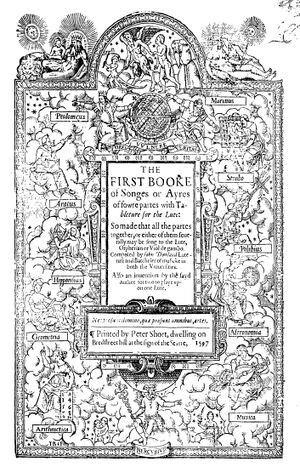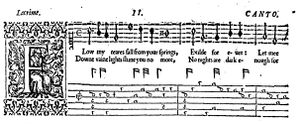Difference between revisions of "Flow my tears"
(Created page with "{{Short description|song by John Dowland}}<!-- no repetition of page title--> <!-- if it is not a solitary work, here comes the infobox from the work containing it. E. g., not...") |
|||
| Line 94: | Line 94: | ||
{{Libretti | {{Libretti | ||
| country = UK | | country = UK | ||
| language-note = | | language-note = | ||
| libretto-text =<poem> | | libretto-text =<poem>Flow, my tears, fall from your springs! | ||
Exiled for ever, let me mourn; | |||
Where night's black bird her sad infamy sings, | |||
There let me live forlorn. | |||
Down vain lights, shine you no more! | |||
No nights are dark enough for those | |||
That in despair their lost fortunes deplore; | |||
Light doth but shame disclose. | |||
Never may my woes be relieved, | |||
Since pity is fled, | |||
And tears and sighs and groans my weary days | |||
And | Of all joys have deprived. | ||
From the highest spire of contentment | |||
My fortune is thrown, | |||
My | And fear and grief and pain for my deserts | ||
Are my hopes, since hope is gone. | |||
Hark! you shadows that in darkness dwell, | |||
Learn to contemn light | |||
Happy, happy they that in hell | |||
Feel not the world's despite.</poem> | |||
' | |||
</poem> | |||
<poem> | <poem> | ||
<nowiki>*</nowiki>) "loue" → "love"; "enuite" → "invite. Often, "v" and "u" are used interchangeably. | <nowiki>*</nowiki>) "loue" → "love"; "enuite" → "invite. Often, "v" and "u" are used interchangeably. | ||
| Line 236: | Line 174: | ||
|quote=}} | |quote=}} | ||
</ref> | </ref> | ||
}} | }} | ||
[[Category:16th-century music]] | [[Category:16th-century music]] | ||
[[Category:17th-century music]] | [[Category:17th-century music]] | ||
[[Category:secular]]<!-- secular or sacred --> | [[Category:secular]]<!-- secular or sacred --> | ||
Revision as of 21:09, 2 October 2021
| The First Booke of Songes or Ayres | |
|---|---|
| by John Dowland | |
 Cover of "The First Booke of Songes or Ayres"[1] | |
| Published | 1597 |
| Publisher | Peter Short, London |
"Come again! Sweet love doth now invite" (Original: "Come againe: sweet loue doth now enuite") is a song by John Dowland and appears in his First Booke of Songes or Ayres, first published in 1597.[2]
It appears on the following album:
| Year | Album | With |
|---|---|---|
| 2021 | À sa guitare (Album) | Thibaut Garcia |
Libretto
from First Booke of Songes or Ayres
John Dowland (music), Anonymous (words)
Flow, my tears, fall from your springs! *) "loue" → "love"; "enuite" → "invite. Often, "v" and "u" are used interchangeably. | |
Manuscripts and sheet music

Dowland, John (1597). "The Firste Booke of Songes". IMSLP. Peter Short, London. Retrieved October 1, 2021.
References
- ↑ 1.0 1.1 Dowland, John (1600). "The Firste Booke of Songes". IMSLP. George Eastland, printed by Thomas Este, the assigne of Thomas Morley, London. Retrieved October 1, 2021.
- ↑ "First Booke of Ayres". Wikipedia. Archived from the original on October 2, 2021. Retrieved October 2, 2021.